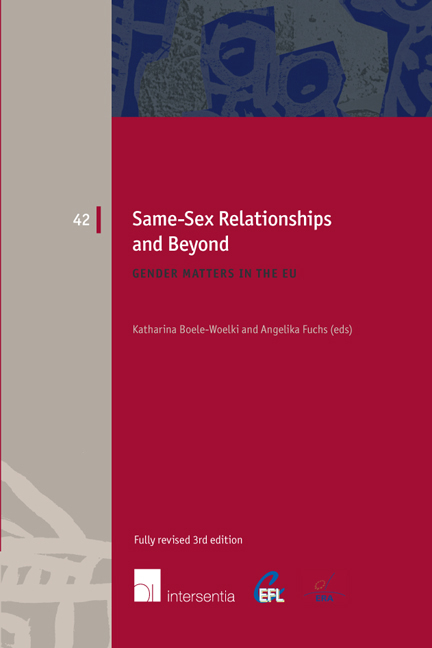Book contents
- Frontmatter
- Preface
- Contents
- List of Authors
- Part I Formalising a Same-Sex Relationship: Marriage and Partnership
- Part II Parenthood and Children's Rights
- Parenthood for Same-Sex Couples in the European Union: Key Challenges
- Recent Case Law on Cross-Border Surrogacy
- Law and Practice of Intercountry Adoption
- Part III Gender Identity and Human Rights
- EUROPEAN FAMILY LAW SERIES
Recent Case Law on Cross-Border Surrogacy
from Part II - Parenthood and Children's Rights
Published online by Cambridge University Press: 29 September 2018
- Frontmatter
- Preface
- Contents
- List of Authors
- Part I Formalising a Same-Sex Relationship: Marriage and Partnership
- Part II Parenthood and Children's Rights
- Parenthood for Same-Sex Couples in the European Union: Key Challenges
- Recent Case Law on Cross-Border Surrogacy
- Law and Practice of Intercountry Adoption
- Part III Gender Identity and Human Rights
- EUROPEAN FAMILY LAW SERIES
Summary
There is no consensus on surrogacy among the various European Member States: some countries, such as the United Kingdom or Greece, not only allow for surrogacy agreements, but provide for a specific set of laws to regulate them. Others, such as Belgium or the Netherlands, do not prohibit surrogacy (although they prohibit commercial surrogacy) but implement very strict rules and restrictions on carrying it out in their territory. Some others, such as Poland or Romania, seem to ignore the topic altogether. And there are some, such as France or Germany, that strictly prohibit any kind of surrogacy, including sometimes under criminal penalties.
It is therefore not surprising that many couples, including same-sex couples (mostly men who neither have access to medically assisted procreation, which I will refer to as IVF below, nor to any other option but adoption) resort to surrogacy abroad, in countries where it is either allowed, or easier, and come back to their home countries with children who are deemed to be theirs according to foreign birth certificates.
These situations raise a number of legal issues. The first one, the transcription of the particulars of the foreign birth certificates in the home-country registrar of civil status, was at the core of the most recent European Court of Human Rights (ECtHR) rulings, Mennesson v. France and L abassee v. France. Yet these two decisions have not entirely put an end to the debate, as evidenced by the two different follow-ups of those rulings from the French Supreme Court and the German Supreme Court. Furthermore, cross-border surrogacy raises even more far-reaching questions about the establishment of parentage and evidences how outdated some rules of private international law on parentage have become. Lastly, they raise immigration and nationality issues, the practical importance of which should not be underestimated.
TRANSCRIPTION OF FOREIGN BIRTH CERTIFICATES FOLLOWING A CROSS-BORDER SURROGACY: A QUESTION ONLY HALF ANSWERED
FRENCH EXAMPLE: A GENERAL PROHIBITION WITH AN INTERNATIONAL SCOPE THAT PREVENTS TRANSCRIPTION
In countries which prohibit surrogacy, the question is whether this prohibition should have extra-territorial scope and extend as far as to prevent the recognition of the parent–child relationship validly created abroad.
- Type
- Chapter
- Information
- Same-Sex Relationships and BeyondGender Matters in the EU, pp. 123 - 142Publisher: IntersentiaPrint publication year: 2017
- 1
- Cited by



